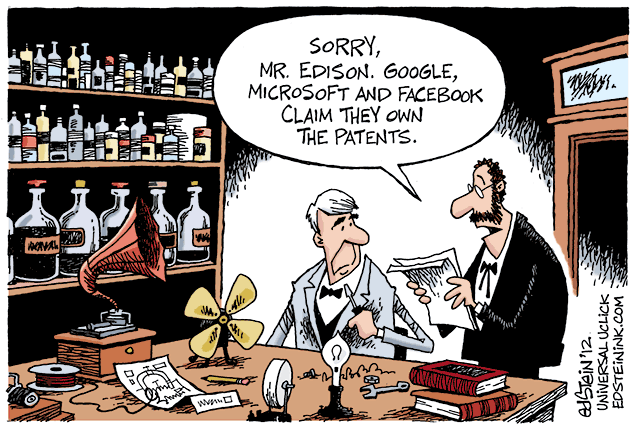According to the constitution, patents are supposed to “promote the Progress of Science and useful Arts”, but nowadays they are mainly used to stifle innovation, crush competition, and keep lawyers employed.
Part of the problem is that patents are supposed to be for things that are “non-obvious”, but the patent office is so overwhelmed they can’t take the time to sort things out. They usually just end up granting patents that never should have been issued, on the theory that if there is a problem it will get sorted out in court.
Bad idea.
I make my living from software, but I believe there should be no patents issued for software at all.



8 Comments
As someone who has filed two patents (both hardware/architecture related, not software), and I agree wholeheartedly.
A major source of the patent office being overwhelmed has to do with how patents are written now. While the original idea of a patent was to make it very clear what was being invented so that anyone could follow the patent step-by-step (so as to confirm easily that one’s product is not infringing), the approach now is to make the claims as vague as possible. The goal is to make the patent as broad as possible so that it can be interpreted very generously to profit from infringement lawsuits. In both cases, I’ve gone back and read the description of my inventions and the claims. Had I not been the inventor, I would have had no clue what was being described.
This leads to a similar problem that is clogging up the courts. Because the patents are so vague, doing a search to determine if your idea has already been patented is absurdly difficult. When you submit your application, you must disclose anything that you consider to be prior art. The patent office does not do any additional investigation. So if you omit things because (a) you are acting in bad faith, or (b) you really can’t tell that some vague description covers the same idea you have, there’s a good chance the patent will be approved. This leads to lawsuits back and forth because multiple parties all claim to have patented the same thing.
The whole system is just a mess and does absolutely nothing to promote progress.
Spot on, Michael. I’ve had the same experience. Most of the time, you don’t even care about prior art when filing a patent — you just try to make it as broad as possible. We call them “defensive patents” — you file them in case someone sues you, so you can sue them back and (hopefully) settle.
Absolutely no promotion of progress.
I find it funny that the Wikipedia article, built on Creative Commons, makes no mention of it in that article aside from the bottom organizer for Intellectual Property arguments.
I’ve dealt with using Creative Commons before, and it’s so easy. I don’t know if licensing software is just as easy, but it can’t be any more complicated than licensing photos and books and music with fair attribution, right?
But that might have something to do with Creative Commons not really being for profit for the copyright holder :/
I, too, hold a software patent. I don’t think it should have been patentable, but it is. The company lawyer found out about what I was doing and wrote it up. From what he submitted, I would never have guessed that my work was the source of the patent. My work involved applying some mathematics to a real-time software data stream. The lawyer made it sound like an extreme application of physics. If I couldn’t understand it, there’s no way a federal bureaucrat would understand it.
Software should be protected by copyright, not patents. And patents have gotten completely out of control. When you have companies (and there are several) whose ENTIRE BUSINESS MODEL is patent infringement lawsuits against other companies, you know something has gone terribly wrong.
Here’s a tangible example:
I sold my little software company to a big enterprise SW company. After the deal their lawyer “showed off” by showing the law suit he had prepared to sue my company for patent infringement if the deal failed to materialize.
The kicker –he admitted the law suit was bogus – their aim was to buy us or put us out of business (so no one else could buy us).
Exactly Gerald! Nobody would buy a company if it is in the middle of a patent infringement lawsuit — bogus or not. Like I said: “crush competition”.